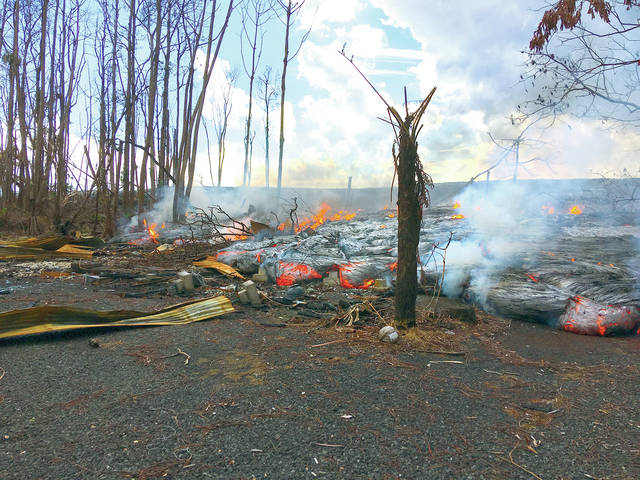Hawaii County is looking beyond public lands for a potential land swap with Puna residents who lost their homes to lava.
Roy Takemoto, an executive assistant to Mayor Harry Kim, said an idea being explored is to partner with a private land owner by providing infrastructure for a development in exchange for land being set aside for evacuees.
That’s an option that he said was raised with W.H. Shipman, which plans to seek zoning changes for property in Keaau for a residential and commercial development. Takemoto said the discussions are preliminary, and the matter hasn’t been taken to the Shipman board.
“We initiated talks with them, but they need to do their own due diligence,” he said.
Takemoto said a benefit would be housing displaced residents near services and jobs while being able to transfer the land to them. Use of state land near Pahoa for relocation is another option being considered, though residents likely would have to lease the land rather than own it outright.
Shipman President Bill Walter said they’ve had “broad discussions” with the county but wouldn’t characterize it as involving a land swap.
“There’s been a good discussion,” he added. “We certainly haven’t reached any conclusions.”
During Tuesday’s eruption meeting in Pahoa, Mayor Harry Kim characterized the relocation efforts as the “future of Puna,” which also will incorporate agriculture.
He asked for patience from those in attendance and noted the state and Federal Emergency Management Agency are working on the issue.
“We’re not just talking about dividing up land,” Kim said. “We’re talking about building a community, which means resources of roads, resources of water and power and those things, which will take time to plan and implement.
“My promise to you is give us time, and we will get this done.”
During the meeting, residents were asked a series of questions about their situation, including whether they lost a home and how much they can afford for rent, with hand-held clickers recording their answers.
One question asked was where they would stay if they had to wait 18 months for a land exchange. Kim said he didn’t know if it would take that long.
Takemoto said the county is using the surveys to fine-tune assistance programs, which also could involve funding more Section 8 housing vouchers and changing building regulations to allow for additional housing units on properties, in addition to other steps. He noted that many participating in the survey responded that they couldn’t afford rent more than $500 a month.
“That tells me we need to focus a lot on rentals and possibly increase our amount for the Section 8 rental subsidy voucher program,” Takemoto said.
He said the county is creating a matrix of costs for different assistance programs in order to present a funding request to the state and federal agencies. The hope is to have that done by the end of the month.
“Once we have that, we will be able to sort out the different funding possibilities,” Takemoto said.
Evacuees can sign up for individual assistance through FEMA. The Hawaii Community Foundation also offers rental assistance.
Geoffrey Last, whose home is still standing in Leilani Estates, told county officials at the meeting Tuesday that FEMA denied him for assistance because the county gave him a letter saying he’s in a voluntary evacuation area. He said he can’t live in the home because of his wife’s medical issues and the proximity to the eruption.
Takemoto told him the county was meeting with FEMA on Wednesday and would raise that issue.
“(The letters) worked for some and worked against some,” he said.
FEMA officials have said that a denial usually isn’t the end of the process and there still can be ways to get help.
Last said he is appealing the denial, and agency representatives asked him to show them doctor’s notes.
Email Tom Callis at tcallis@hawaiitribune-herald.com.

